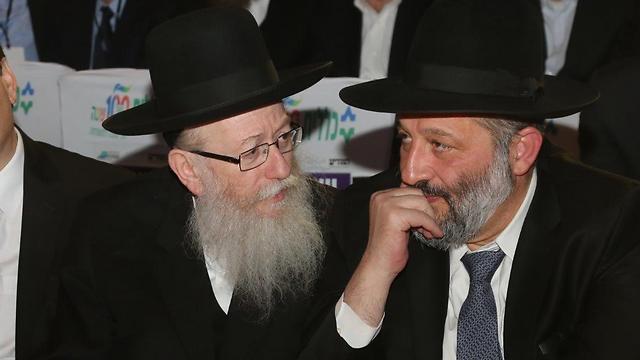
Health Minister Yaakov Litzman, who submitted his resignation Sunday
צילום: יואב דודקביץ'
Shabbat train crisis: A reflection of Haredi sector changes
Op-ed: Ultra-Orthodox politicians like Litzman, Deri and Gafni are torn between the expectations of their elderly rabbis and the expectations of the Haredi street, which are fueled by commercial websites and Haredi radio stations. The new Haredi world is populist, demagogic and verbally aggressive, and it is dragging the rabbis along with it.
It’s allegedly an idiotic crisis, a whim of a rabbi who reached the train of time too late, a small intrigue in a detached Hassidic dynasty. Health Minister Yaakov Litzman has left in order to return. The Health Ministry’s patients will keep getting sick, the trains will keep being late and the coalition will keep producing bills reeking of corruption.

“A prime minister is replaced in the ballot box,” Benjamin Netanyahu has declared. A prime minister may be replaced in the ballot box, but he is kept in place through the Ger Rebbe’s ear. That’s why he’s putting such a huge effort into Litzman.
We may find it amusing, but this is a significant crisis. It points to the historic change the ultra-Orthodox sector is going through. The ghetto walls are being cracked and are threatening to break open. What the external pressure—from Yair Lapid and others—has failed to do is now being done by the internal pressure. We know the reasons: The growing population, the poverty, the idleness, the Internet access, the social media.

Litzman (L) and Deri. As young Haredim are peeking beyond the wall and adopting what they are finding, their politicians are growing weaker (צילום: מוטי קמחי)
Young Haredim are peeking beyond the wall and adopting what they are finding there. One of the results is that the politicians are growing weaker. Litzman, Aryeh Deri, Moshe Gafni and their colleagues are torn between the expectations of their elderly rabbis and the expectations of the street, which are fueled by commercial websites like Behadrei Haredim and Kikar Hashabat and by the Haredi radio stations. The new Haredi world is populist, demagogic and verbally aggressive, and it is dragging the elderly rabbis along with it.
When the Haredim lived within the walls, their politicians focused on caring for the sector. In fact, they had a pact with the secular majority: You’ll give us everything we need and let us surround ourselves with walls, exempt ourselves from duties and control our community, and we’ll let you decide on everything else. You’re the seculars—it’s your war, your peace, your economy, even your Shabbat. The emergence of Rabbi Ovadia Yosef, Shas’ spiritual leader, who was influential both within and outside the walls, was unusual. The Ashkenazi rabbis didn’t follow in his footsteps.
But the street changed. Now it wants it both ways—both exaggerated sectorial benefits and an impact on the non-Haredi public domain. Both to receive an exemption from military service and to halt Israel Railways’ infrastructure work and close supermarkets on Shabbat. The fact that the current government is more generous towards the Haredim than any other government in the past only increases their appetite. The street isn’t grateful to Netanyahu for what he has given. It sees and demands more.
This leads to an explosive collision, because non-Haredim have interests and an agenda and ballots too. If the infrastructure work isn’t conducted on Shabbat, the train will be put out of service on Sunday, and the protest of soldiers unable to reach their bases will be reflected in their parents’ vote. The Likud party can afford to hand out money and jobs and enact personal laws, but when it comes to the train passengers’ protest—it must be careful.
The Ger Rebbe doesn’t usually meet with non-Haredi politicians, doesn’t read any newspapers apart from Hamodia, doesn’t watch television and doesn’t surf the Web. A secular journalist has a better chance of reaching Ayatollah Khamenei than the Ger Rebbe.
If I could visit him, this is what I would tell him: Honorable rabbi, I know how distressing this is for you, but there’s nothing you can do about it—the world is changing. Even the Saudis realized that and appointed as their crown prince a 32-year-old guy who has promised to carry out major reforms in the government, in the economy and—most importantly—in religious politics. The road you are taking won’t preserve the walls and won’t turn secular Israel into a halachic state. You’ll get swept away in the flow.
From a political aspect, you’re bringing about a national Likud government which will harm your sectorial privileges. From a historical aspect, you’re lagging behind, and you’re lagging there on your own, with God’s help. You should take that into account.










